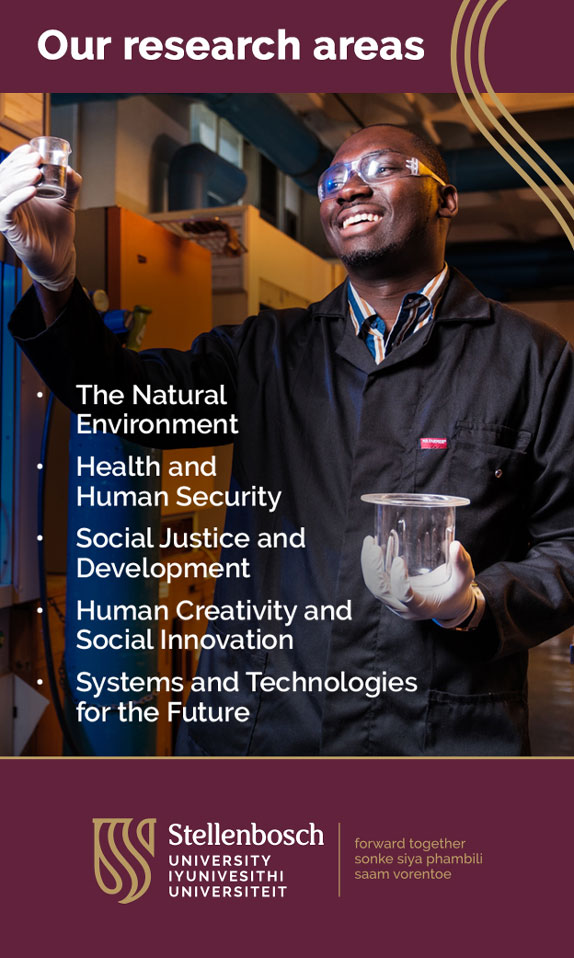Stellenbosch University’s research areas are diverse and cover several disciplines. Here are some of the areas of excellence:
Animal TB
Tuberculosis (TB) is a global threat to humans, domestic animals and wildlife, and research undertaken at Stellenbosch University aims to provide valuable insights into the biological mechanisms causing TB in animals and humans alike. To prevent and manage TB in animals and humans, we need to look at the whole picture, including how the pathogens change and host adaptations occur. The value of this research group is that they provide a better understanding of how TB organisms react in different animals (hosts), which will protect our natural heritage and the health and livelihoods of communities.
Cancer
Cancer does not distinguish between race, gender, age or socioeconomic position. Despite a concerted global effort, only marginal progress has been made in the war against this disease. While progress has been made in the field of oncology, there still exists a need for treatments that are less taxing on a patient’s health status, while not invoking counter-evolutionary strategies from tumour cells. The specific research focus of the cancer research group under leadership of Prof Anna-Mart Engelbrecht in the Department of Physiological Sciences is to explore new avenues of chemotherapy and supplementary treatments that would favour the use of lower chemotherapy concentrations with less impact on normal healthy cells, while maintaining satisfactory levels of cancer cell death.
Food Security
Food security is a global issue and widespread food insecurity and hunger persist in South Africa’s urban and rural areas. The current drought and water shortages in the Western Cape are likely to further impact on food and nutrition security, particularly affecting vulnerable communities. While the country is food secure at a national level in terms of aggregate food availability, research suggests that one in two households is at risk of hunger; 16% of people consume less than adequate amounts of energy; and about 20% of children under nine years of age are stunted. Stellenbosch University has created a platform on which a range of research projects in terms of food security have been developed, including teaching programmes and community engagement projects spanning different faculties and departments.
Renewable Energy
Modern power generation is increasingly making use of renewable energy technologies, driven by significant technology cost reductions and a focus on cleaner energy. Research in the past focused largely on the renewable energy generation technologies themselves. As more and more renewable energy generators are connected to existing power systems, research on how to integrate renewables into these power systems is growing in importance. The Stellenbosch University Centre for Renewable and Sustainable Energy Studies was established in 2007 as the national hub of the postgraduate programme in renewable and sustainable energy studies. The Centre has become the best known research centre in renewable energy based at a university in South Africa, and is also internationally acknowledged as a centre of excellence in certain renewable energy disciplines.
Square Kilometre Array
The Square Kilometre Array (SKA) radio telescope and associated research chair provides an unparalleled opportunity for researchers and postgraduate students at Stellenbosch University to work very closely with one of the largest scientific engineering endeavours in the world. Our Department of Electrical and Electronic Engineering has a long history of training microwave and radio frequency engineers, which put Stellenbosch University in an ideal position to take up the opportunity to be involved – an opportunity that yielded an impressive amount of research outputs, graduate students and engineering prototypes. Several graduates of this programme have taken up positions within the South African SKA project, while others are working all over the world at research centres, universities and private companies.
Wine
Wine is an unusual agricultural consumer product: a lifestyle and frequently perceived as a luxury product, subjected to strong fluctuation of total output and consumer attitudes. An analysis of cycles in wine production over time can teach us much about the status of the industry. Researchers at Stellenbosch University have been involved in a global study of wine cycles in all countries that produce wine, to try and identify what drives these cycles. In South Africa, it is clear that domestic consumption has not been enough to drive production, and that the industry depends on exports for its growth.







